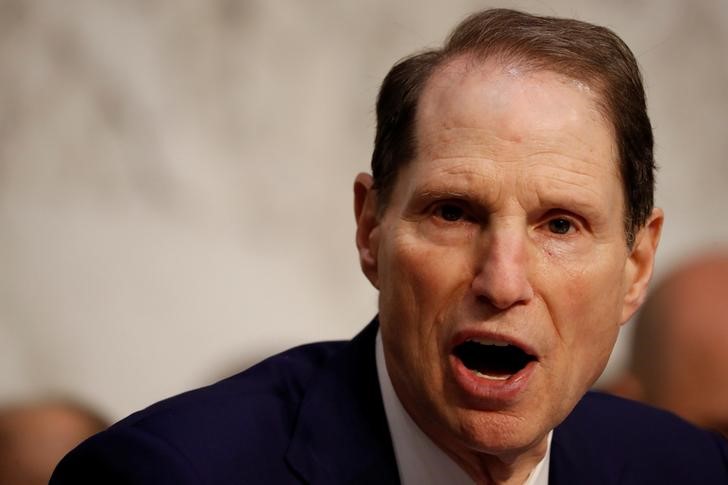Investing.com’s stocks of the week
By David Morgan
WASHINGTON (Reuters) - U.S. Senate Democrats on Wednesday said corporations are funneling savings from December's sweeping Republican tax overhaul into nearly $100 billion in share buyback programs that promise little benefit to American workers.
In a report unveiled weeks after President Donald Trump enacted the tax cuts, Senate Democrats said they had identified more than two dozen buyback programs announced since Jan. 5 by banking, energy, manufacturing, retailing and other companies.
The buybacks show that the first priority of corporations is to use their windfall from the tax overhaul to "line the pockets of powerful senior executives and shareholders," said Senator Ron Wyden, the senior Democrat on the Senate Finance Committee.
The report attacks Republican claims that the tax overhaul is delivering higher wages to workers by slashing the corporate income tax rate to 21 percent from 35 percent and providing businesses with other lucrative benefits.
Senate Republicans had no immediate response.
The new tax law and its impact on workers and the wealthy are likely to play a major role in this year's congressional mid-term election campaign, which will determine whether Republicans maintain their control of the Senate and House of Representatives.
Hundreds of companies have announced one-time bonuses for workers, wage increases, additional retirement account contributions and new investments since Congress passed the Republican legislation over unified opposition from Democrats.
It is unclear whether the law will lead to the sustained economic growth Republicans have promised.
U.S. job growth surged in January, while wages had their biggest annual gain in over 8-1/2 years, according to the Labor Department.
A Reuters/Ipsos poll released on Jan. 29 found that only 2 percent of adults said they had received a raise, bonus or other benefits due to the tax law.
While many corporations have described bonuses as a way to share their tax windfalls with employees, tax experts said the chance to grab one last lucrative tax deduction under the higher 2017 corporate tax rate provided motivation to book bonuses by the end of 2017.
Wyden called on the Government Accountability Office, a watchdog arm of Congress, to analyze the tax law's impact on jobs, wages and corporate investment.
"The American people deserve an honest accounting of how this tax law is working," he told reporters.
Democrats said the buyback programs range in size from over $22 billion for Wells Fargo & Co (N:WFC) to $500 million each for PulteGroup Inc (N:PHM) and Visteon Corp (O:VC). The Wells Fargo total is based on the bank's share price at the time the buyback for up to 350 million shares was announced.
The value of some of the buybacks is vastly larger than corporate pledges made to benefit workers, Democrats said.
TrimTabs Investment Research, which tracks buybacks, said it has seen 69 buyback announcements worth a combined $101.3 billion as of Feb. 7, with the biggest programs from companies expected to benefit most from the tax changes.
"The number of announcements has been one of the lowest in eight years, while volume has been near the top," TrimTabs analyst Winston Chua said.
